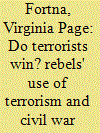|
|
|
Sort Order |
|
|
|
Items / Page
|
|
|
|
|
|
|
| Srl | Item |
| 1 |
ID:
118180


|
|
|
|
|
| Publication |
2012.
|
| Summary/Abstract |
Why do some states emerging from civil war take significant strides toward democracy while others do not? The existing literature comes to contradictory and puzzling findings, many of which, we argue, are driven by methodological problems. We examine the determinants of democratization in the short, medium, and long term after civil wars ending between 1945 and 1999. Other than a short-term effect of negotiated settlements, we find little support for the prominent claim that the outcome of the war shapes the prospects for postwar democratization. Neither does peacekeeping foster democratization. Meanwhile, consistent with the more general democratization literature, we find that economic development aids democratization while oil wealth hinders it. In short, we find the determinants of democratization to be much the same for post-civil war societies as for other societies.
|
|
|
|
|
|
|
|
|
|
|
|
|
|
|
|
| 2 |
ID:
140349


|
|
|
|
|
| Summary/Abstract |
How effective is terrorism? This question has generated lively scholarly debate and is of obvious importance to policy-makers. However, most existing studies of terrorism are not well equipped to answer this question because they lack an appropriate comparison. This article compares the outcomes of civil wars to assess whether rebel groups that use terrorism fare better than those who eschew this tactic. I evaluate the advantages and disadvantages of terrorism relative to other tactics used in civil war. Because terrorism is not a tactic employed at random, I first briefly explore empirically which groups use terrorism. Controlling for factors that may affect both the use of terrorism and war outcomes, I find that although civil wars involving terrorism last longer than other wars, terrorist rebel groups are generally less likely to achieve their larger political objectives than are nonterrorist groups. Terrorism may be less ineffective against democracies, but even in this context, terrorists do not win.
|
|
|
|
|
|
|
|
|
|
|
|
|
|
|
|
| 3 |
ID:
163274


|
|
|
|
|
| Summary/Abstract |
Why do some rebel groups resort to terrorism tactics while others refrain from doing so? How rebel organizations finance their rebellion creates variation in the extent to which terrorism undermines their legitimacy. Rebel organizations pay attention to the legitimacy costs associated with terrorism. Organizations that rely primarily on civilian support, and to a lesser extent on foreign support, exercise more restraint in their use of terrorism. Rebels who finance their fight with lootable resources such as gems or drugs are least vulnerable to the costs of alienating domestic supporters. Thus, they are more likely to resort to terrorism and to employ more of it. The article elaborates this legitimacy-cost theory and tests it using new data on Terrorism in Armed Conflict from 1970 to 2007. We find robust support for the hypothesis that groups who finance their fight with natural resources are significantly more likely to employ terrorism (though not necessarily to conduct more deadly attacks) relative to those who rely on local civilian support. Groups with external sources of financing, such as foreign state support, may be more likely to engage in terrorism than those who rely on local civilians, but not significantly so.
|
|
|
|
|
|
|
|
|
|
|
|
|
|
|
|
| 4 |
ID:
189960


|
|
|
|
|
| Summary/Abstract |
That terrorism is a “weapon of the weak” is such deeply held conventional wisdom it has become almost a cliché. “Weak” means many different things in the literature, however, and little rigorous empirical research has tested the contention that weaker groups, however conceived, are more likely to employ terrorism. This article explores prominent weapon of the weak arguments to develop testable hypotheses about group strength and the prevalence of terrorism. Using measures of deliberately indiscriminate attacks on civilians by rebel groups in civil conflicts, as well as multiple measures of rebel strength, it examines systematically whether weaker groups are more likely to employ terrorism. I find surprisingly little empirical support for the conventional wisdom. There is no clear or consistent evidence that deliberately indiscriminate terrorism is a weapon of the weak rather than the strong.
|
|
|
|
|
|
|
|
|
|
|
|
|
|
|
|
|
|
|
|
|